The Rao Jodha Desert Rock Park represents a remarkable journey of ecological transformation situated at the foot of Mehrangarh Fort in Jodhpur. Established in 2006 by the Mehrangarh Museum Trust and led by ecological expert Pradip Krishen, this landscape was once a barren wasteland dominated by invasive Prosopis juliflora species. Through meticulous restoration efforts, the park has been transformed into a thriving desert ecosystem that showcases the rich biodiversity of the Thar region.
The park's geological foundation is equally fascinating, comprising volcanic rocks formed approximately 700 million years ago. These ancient formations, including rhyolite, breccia, and welded tuff, have been recognized as a National Geological Monument by the Geological Survey of India. This unique geological context provides visitors with an extraordinary glimpse into the region's prehistoric volcanic history.
Conservation was at the heart of this ambitious project. Krishen and his team systematically removed invasive plant species and reintroduced native desert flora adapted to the harsh arid conditions. This approach not only restored biodiversity but also created a model for sustainable ecological rehabilitation that could be replicated in similar challenging environments.
The park serves multiple purposes beyond ecological restoration. It functions as an educational space, offering four distinct walking trails that guide visitors through different ecosystem zones. These trails connect visitors with the natural landscape, revealing the intricate relationships between plants, geological formations, and the desert environment. Historical sites like an antique aqueduct and Devkund Lake further enrich the visitor experience.
Community development was another critical aspect of the park's vision. By creating employment opportunities and promoting eco-friendly practices, the project demonstrated how conservation efforts can simultaneously support local communities and protect natural ecosystems. The park's management emphasizes sustainable tourism, ensuring that visitor interactions minimize environmental impact.
The Visitors Center, complete with an Interpretation Gallery, native plant nursery, and cafe, transforms the park into a comprehensive educational destination. Here, visitors can learn about desert ecology, conservation strategies, and the importance of preserving unique natural landscapes. Interactive exhibits and guided walks provide deeper insights into the region's environmental challenges and restoration possibilities.
Beyond its ecological significance, the park represents a powerful narrative of human potential to heal and restore damaged landscapes. It stands as a testament to how thoughtful, scientifically informed intervention can transform seemingly hopeless environments into vibrant, living ecosystems. The Rao Jodha Desert Rock Park is not just a park, but a living laboratory of ecological resilience and hope.
By integrating cultural heritage, environmental conservation, and community development, this park offers a holistic model of sustainable landscape management. It demonstrates that with vision, expertise, and commitment, humans can work in harmony with nature to create spaces that are both ecologically rich and socially meaningful.








